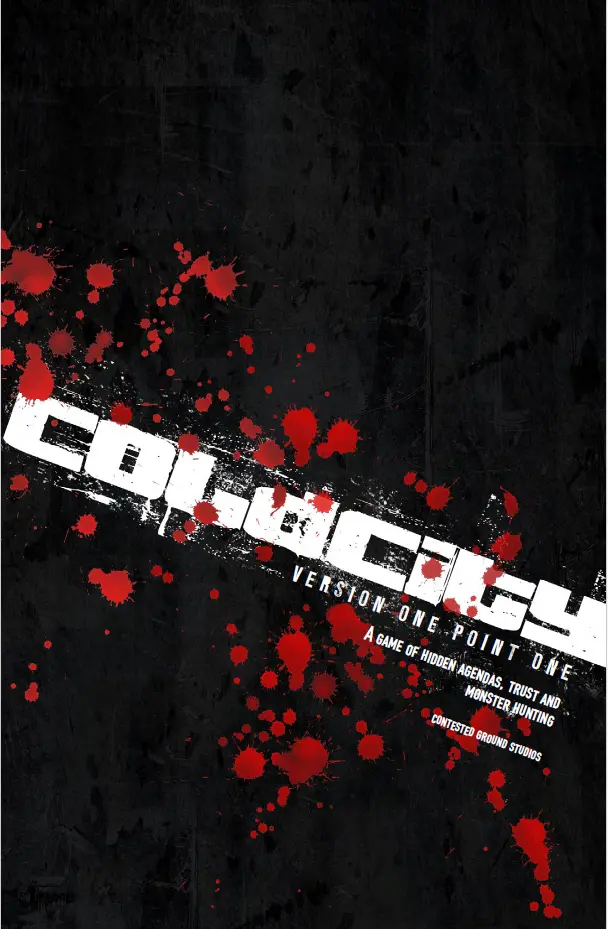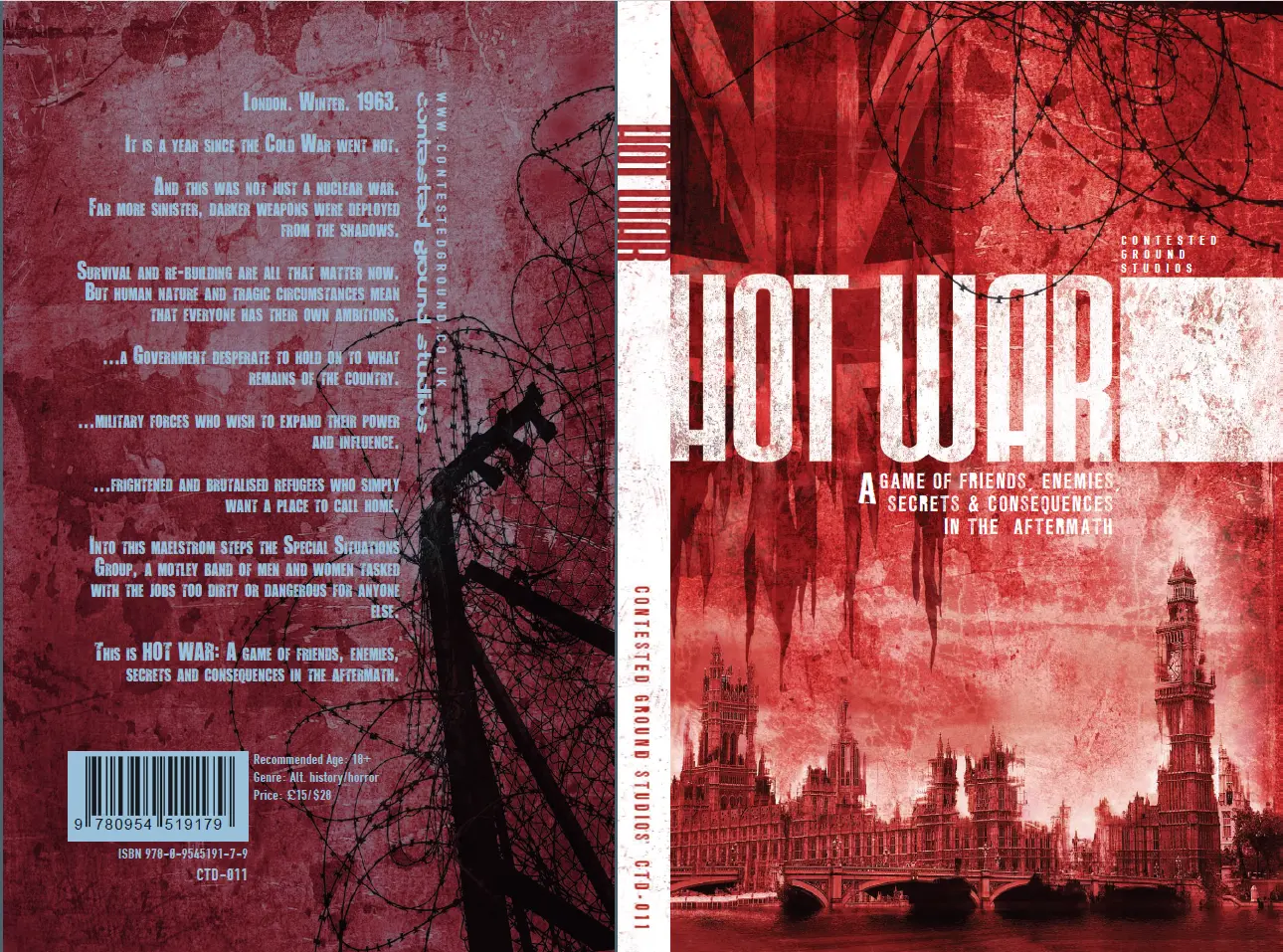Cold City, a campaign I haven't dared to run
The story behind this project is quite simple: The more I learned about history, the less conviction I had I could have pulled it off. But let's start at the foundations.
Imagine a British noir military crime TV series taking place in Berlin. You're working for an uncaring and ridiculously conservative military institution. You have a thankless job and you try to do the right thing. And then you learn that you need to team up with a group frenemies, these so-called allies, and there is something nasty going on behind the scenes. You're a spook, you do a cleanup of monstrous nazi experiments, and things are worse, much worse than they initially appeared. Worse in Lovecraftian ways of getting worse.
Welcome to Cold City.

The books
Cold City is a game by Malcolm Craig, originally released via Contested Ground Studios, currently managed by Handiwork Games.
Cold City takes place in 195X Berlin. You cannot get the original book anymore, but there is a new version under way from Handiwork Games.
So, why I abandoned the project?
The premise of the book seemed so interesting - you're military, and you're tasked to investigate, document and clean up results of Nazi human experiments in the wake of World War II. I have experience with running horror games, so I put my mind, enchanted both by the visual design and potential.
The first issue was the idea that the protagonists are a team put together by the Allies from various forces. I know that Malcolm Craig is a historian, so he may have found it easy to imagine going about such an exotic institution. Me, a person who just loved The Third Man, who hails from Eastern Europe, could not. How could people with entirely different mindsets cooperate on a daily basis?
(page 10) "The typical ‘Cold City’ group would be made up of 4 characters: 1 American, 1 British, 1 French and 1 Soviet, although this isn’t an absolute necessity. This helps to bring a certain level of conflict into the party at the outset, as Cold War tensions and paranoia assert themselves. However, it is entirely possible to run the game with more or less players and a variety of other nationalities."
Still, it would have been doable, hadn't there been a secondary assumption made: the protagonists are expected to scheme against each other.
(page 37) "All characters have hidden agendas. These are things that they either wish to accomplish in a secret fashion or that they have been instructed to do by their political or military masters."
As I am gamemastering for people with wildly diverse social skills, it would be easy for the game to become riddled with grievances. To avoid that risk, I have decided to abandon this premise and consequently change game mechanics (that practically invite this sort of complications).
The second issue was a historical one. In the process of amassing necessary knowledge and documents, I have realized several things about the setup.
One, that Berlin was restored quickly, altogether way faster than one should expect. This means that things were reduced to rubble, that hiding inhumane secrets was next to impossible, and also, that the ongoing renovations would render most of the game timeline very difficult.
Two, that Berlin of that time was a harsh place. The reality was that people died due to shortages, that everyone was prepared to sell the last vestiges of their humanity in order to ensure survival of themselves and their families.
It would not be difficult to just keep secrets. It would also be really awkward to use horrors left in the wake of war to just play a background to Lovecraftian themes. To my surprise, and despite my experiences with grimdark games, I have become uncomfortable with the idea.
Moreover, the complexity of Berlin, of which I barely learned through my excavations, made me also realize that I was unlikely to do justice to the city and the people of that time.
So I procrastinated, until my conviction was strong enough to admit before myself that I am not good enough to run it.
What about Hot War project?

Ah yes, Malcolm Craig made two, maddeningly similar yet so disparate games, a|state, a Dickensian dieselpunk game about a city that suddenly became its own world. It's more realistic twin was Hot War, set in London just after a nuclear war against Lovecraftian horrors unleashed by Soviets in 196x. London is a pocket of barely holding reality, and the characters are trying to keep order in slowly deteriorating city.
The difference was that the a|state setting is stable in its chaotic social conflicts, while Hot War forces hard choices and worsens pressure on characters with each passing day.
Pretty interesting, both games, and both the old and new a|state are simply gorgeous in terms of presentation. They just were not my cup of tea at that time - I can do the same with my fantasy games. Also, I may have appreciated the quality of design of the system, but I was not a big fan of how it led the narrative toward conflicts within the party.
The project materials are probably somewhere on my external storage, though, truth to be told it was not much. Photographs, maps, a few odd bits. Nothing I will need right now, since its history, and since I am going to purchase the new version once it's released.
Takeaway stuff
Ultimately, your game must be something that your players accept. I have learned this the hard way several times, losing games, campaigns and sometimes contact with good people. Paradoxically, the more important the game to players, the longer it runs, the hard it is to resolve issues. The more effort you need to put into your game, the worse your perspective becomes, and the easier it is to break stuff permanently. That's why, as a principle, I don't like playing games where you are supposed to backstab people, or band together against someone in your group.
My research and campaign techniques solidified and evolved (I will probably return to this particular subject in a different article). Consequently, I got better at working with technical documentation.
I have learned how to rapidly prototype fake technical documentation, from spellbooks to police reports. To borrow real life photos and play with them. So, all in all, the major gains were in my skills and research.
Oh, and I was thoroughly awed and humbled by people who lived through World War II. By all their memorabilia. That's why so many things from World War I period found their home in my Cavaliers of Mars campaign.
Further and recommended reading
- RPG Writeup: Cold City - a comprehensive game review with illustrations, by Hostile V
- RPG Writeup: Hot War - as above, by the same person
- Review: Hot War - by Bruce Baugh
- Handiwork Games, current home of Cold City Hot War, a|state